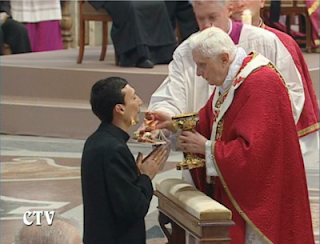A priest colleague in Britain recently related how a drunk man came banging on the door of the church asking for a blessing. He duly gave him the blessing in English. The drunk man accused him, with the help of some choice expletives, of being a protestant. The priest assured him that he was Catholic. The drunk man asked him to prove it. So the priest said: “Benedicat te omnipotens Deus Pater, et Filius, et Spiritus Sanctus.” The man then said: “So you are a real one then. God bless Father” and staggered up the road. I was also interested to note that the Mining Journal recently recalled the anniversary of the excommunication of Martin Luther on January 3rd 1521.
On January 18th we commence the annual Octave of Prayer for Christian Unity which concludes on the feast of the Conversion of St Paul, January 25th.
The Church has suffered many crises throughout its relatively short 2,000-year history, but by far the most serious was the rending asunder of the Mystical Body in the protestant reformation of the sixteenth century. It sometimes seems difficult to hope that the Church will ever be one again, and yet we must be confident in the prayer of Jesus Christ to His Father: “that they may be one even as we are one, I in them and you in me, that they may become perfectly one, so that the world may know that you have sent me and have loved them even as you have loved me.” (Jn 17:22-23)
An encouraging bit of history occurred here in the US on January 1st when Pope Benedict established the Ordinariate of the Chair of St Peter under the patronage of Our Lady of Walsingham. The Ordinariate is a kind of diocese that extends over the whole of the US with its base in Texas. It is specifically for those who were previously Anglican/Episcopalian and who are received into the full communion of the Catholic Church. The Ordinariate will have its own priests, usually former Anglican/Episcopalian priests or bishops, or men who have been raised in Ordinariate families, many of them married (although in the future celibacy will be the norm), and its own parishes preserving their own distinctive Anglican/Episcopalian liturgical traditions. They are as much Catholic as we are: they can participate in our Masses and we in theirs. Pope Benedict has established this Ordinariate, the second of its kind (the first, the Ordinariate of Our Lady of Walsingham, was established in England a year ago today), in response to requests from Anglicans around the world who deeply desired to be one with the Pope, to be Catholic! Australia could be the next country to have such an Ordinariate.
Last weekend a good number of our parishioners joined our Christian brothers and sisters at Grace Lutheran Church for a service of evening prayer. It is good for us to take up opportunities to pray with and for one another. But we best serve the cause of Christian Unity, not by ignoring or covering over our differences, but by being truly and authentically Catholic. Perhaps we have been reticent about boldly proclaiming who we are as Catholics. With all the changes in the Church over recent decades, perhaps we have forgotten who we really are. Sometimes we might even disown our traditions. Think of the drunk man at the top of this piece who recognized the priest as Catholic when he heard him say the blessing in Latin!
One of the reasons for Pope Benedict’s promotion of the Extraordinary Form of the Mass (commonly known as the Latin Mass) was to reconnect the Church with its history, to reconcile the Church of today with its tradition. You will notice a more “traditional” style in the celebration of the Mass since the advent of the new English missal, with greater use of Latin. Tradition is often considered a dirty word, but if we are not traditional, we are not Catholic. To be Catholic, we must always remain in continuity with the living tradition we have inherited.
May the Lord keep us united in love for one another. Fr John.












